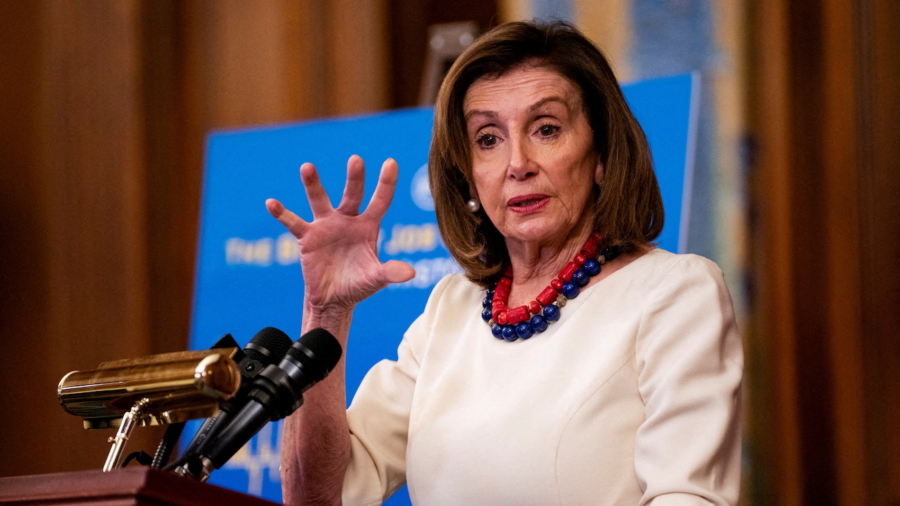The House passed the controversial COMPETES Act in a mostly party-line 222–210 vote on Friday morning.
The bill, nominally intended to increase U.S. competitiveness with China but loaded with other, less relevant provisions, was unanimously opposed by all Republicans with the support of Rep. Stephanie Murphy (D-Fla.), a House moderate who has struck out a position against her party often.
Only Rep. Adam Kinzinger (R-Ill.), who was officially censured by the RNC on Thursday for his role on the Jan. 6 Committee, voted with Democrats to pass the bill.
In a 20-page summary of the bill released to Speaker Nancy Pelosi’s (D-Calif.) website, Democrats say that the bill is “a bold legislative package that makes transformational new investments in research, innovation and American manufacturing that will ensure that America can outcompete any nation in the world, now and for decades to come.”
“The package will accelerate U.S. production of critical semiconductor chips, strengthen the supply chain to make more goods in America, turbocharge our research capacity to lead the technologies of the future, and advance our global competitiveness, while supporting strong labor standards and human rights, among other key provisions,” it continues.
The release notes that the bill is one acceptable to both sides of the aisle, inasmuch as “its major components include many bills that have already passed the House by strong bipartisan votes or have bipartisan cosponsors.”
The bill indeed has several provisions that Republicans and Democrats both agree are necessary.
For instance, one section of the bill is designed to increase the United States’ extraction of semiconductor metals and manufacturing of microchips.
This is a sector that America has allowed east Asia to dominate over the past several decades. In 1990, America produced around a third of the world’s microchips; by 2021, that number had careened to only 12 percent according to the Semiconductor Energy Association (pdf).
However, other sections of the bill are far less agreed upon.
For one, the COMPETES Act would “[invest] in the fight against climate change” by “supporting research to advance the next generation of energy storage, solar, hydrogen, critical materials, fusion energy, manufacturing, carbon removal, and bioenergy technologies, among many other areas.”
Democrats are also anxious that the bill’s funding emphasizes “diversity.”
Historically, research and tech funding in the United States has been targeted to specific sectors or projects. Generally, these are carried out by already-existing agencies like NASA or the CDC, or through government-contracted third parties.
Democrats’ proposed bill would instead focus on “strengthen[ing] and expand[ing] our nation’s STEM workforce to better represent the diversity of our nation.”
To meet the goal of “investing in the fight against climate change,” the bill would “[prepare] the next generation of diverse clean energy researchers, scientists, and professionals.”
The COMPETES Act would also push to increase “diversity” among STEM teachers.
The release explains how the bill would go about meeting these “diversity” goals. It would “[empower] Federal agencies and universities to identify and lower barriers to the recruitment, retention, and advancement of women, minorities and other groups underrepresented in STEM studies and careers.”
In addition, it stipulates that agencies are required “to collect comprehensive demographic data on the grant review process and STEM faculty at U.S. universities.” It also “[p]rovides supports for grant recipients who also have caregiving responsibilities.”
Moreover, the COMPETES Act would allow for the importation of thousands of new refugees, even as the United States faces an unprecedented level of illegal immigration at its southern border.
Even more controversially, the bill would allow for a new class of “investor visa,” in short allowing the wealthiest citizens from other countries to enter the U.S. for no reason other than their wealth.
While Republicans in the House had little chance of stopping the bill in the lower chamber, where a simple majority rules, it is clear that Republicans are broadly opposed to the legislation.
In the Senate, where all legislation must achieve a 60-vote threshold to end debate and go to a simple majority floor vote, Republicans could do far more to stop the legislation. As long as 41 of the chamber’s 50 GOP senators oppose the bill, they would be able to deny Democrats the 60-vote threshold and force them back to the negotiating table.
From The Epoch Times


